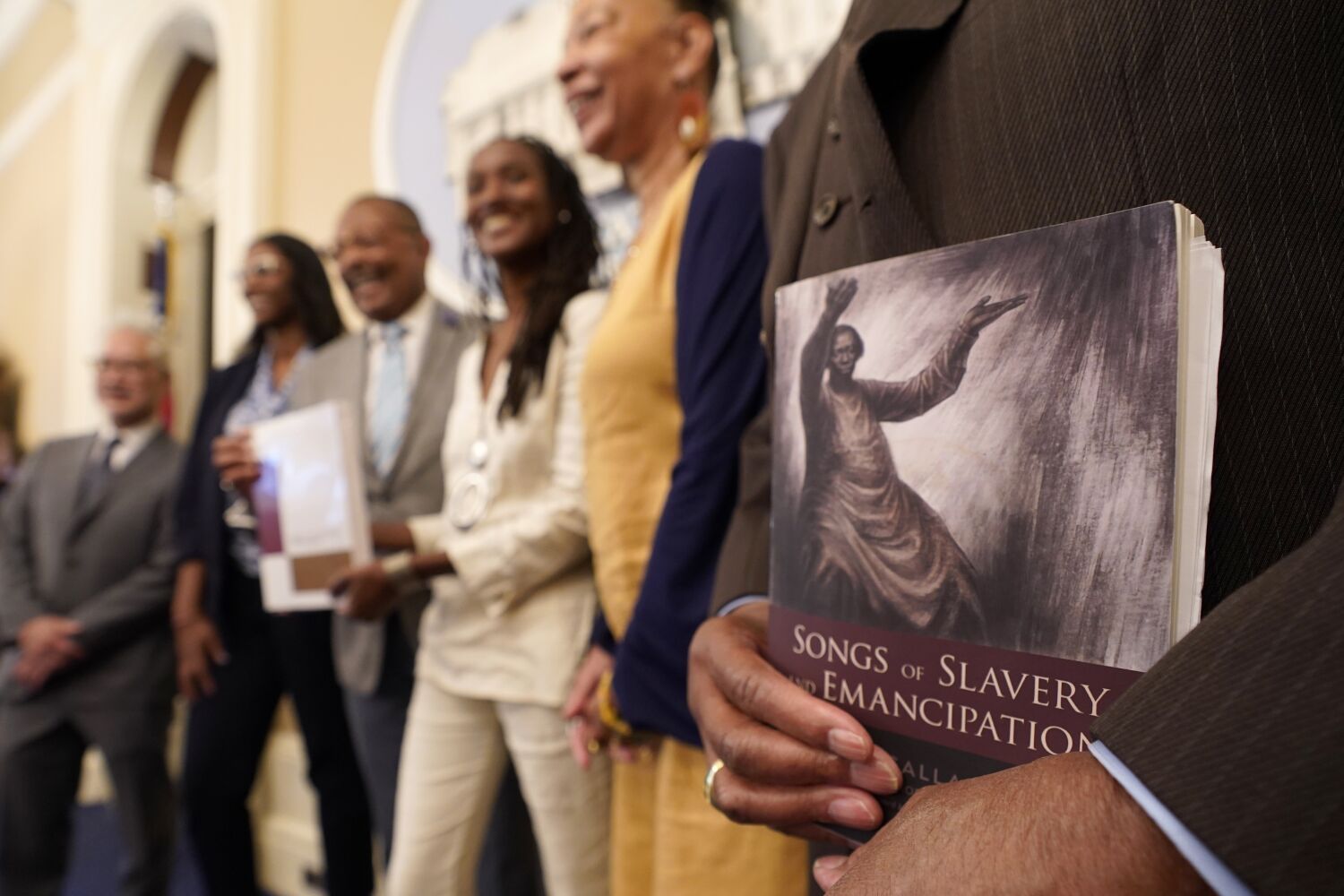Global Courant 2023-05-07 07:37:10
California’s Reparations Task Force voted Saturday to recommend that the state issue a formal apology for slavery and potentially provide billions of dollars in cash payments, continuing a historic effort to establish remedies and compensation for descendants of African Americans who were enslaved in the US.
The vote at a public meeting in Oakland marks the beginning of the end of the nine-member panel’s two-year process to prepare a report recommending reparations for slavery, which will be presented to the state legislature on July 1 must be submitted.
The report will serve as a guide to lawmakers and Governor Gavin Newsom, who created the task force in 2020 to study and collect the harms of slavery and enduring discrimination as state elected officials begin to debate righting the wrongs from the past.
The task force has heard testimony from more than 133 witnesses, including scholars describing California’s racist history and economists who have offered suggestions for quantifying compensation for health disparities, mass incarceration and offspring housing discrimination. Families affected by slavery have shared their own experiences and calls for various forms of remedies in 28 hours of emotional public commentary at dozens of monthly meetings since the task force first met in June 2021.
With the group ending its work, persuading lawmakers to pass the recommendations into law and provide hundreds of billions of dollars in reparations at a time when California faces a budget deficit could be its biggest challenge yet.
“I am optimistic that they will review our proposals and try in good faith to implement them,” said Kamilah Moore, the task force chair.
Although California banned slavery in its 1849 constitution, the state had no laws making it a crime to enslave anyone or demand their release, allowing slavery to continue. A disproportionate representation of white Southerners with pro-slavery views held office in the legislature, the state court system, and in the congressional delegation.
California’s Fugitive Slave Law of 1852, which allowed slaveholders to use violent means to capture enslaved people who arrived in California before statehood and escaped, or refused to return to slave states with their slave, was rare among free states.
Kenneth Henderson is making a statement to the California Reparations Task Force at the California Science Center in Los Angeles in September.
(Carolyn Cole/Los Angeles Times)
Racial hierarchy continued to take root in California when slavery was federally abolished by the 13th Amendment in 1865. The task force’s findings detail the lasting effects of segregation and discrimination against black people on political, legal, health, financial, educational, cultural, environmental , social and economic systems, leading to disparities in physical and mental health and a racial wealth gap.
Who is eligible for compensation?
The issue of eligibility has been one of the most contentious issues for the task force. Some advocates argued that all black Californians should be eligible for reparations, though jurists have stated that broad race-based solutions could pose legal challenges.
The task force ultimately narrowed down eligibility based on descent as “determined by a person who is an African American descendant of an enslaved person or the descendant of a free black person who lived in the United States before the late 1800s .”
In its compensation models, the task force cited 2020 population estimates of fewer than 2 million non-Hispanic African American residents living in the state.
How do I prove eligibility?
That hasn’t been fully answered yet.
The task force recommends that the legislature create a new California American Freedman Affairs Agency dedicated to implementing the task force’s recommendations adopted into law, including determining eligibility and helping people identify their ancestry. prove. The agency should have a “genealogy department to support potential reparations claimants by providing access to expert genealogy research to confirm eligibility of the reparations,” according to a draft of the final policy recommendations.
How much money do people get?
economists calculated preliminary estimates of monetary losses in three categories of community harm: health disparities, African-American mass incarceration and overpolicing, and housing discrimination.
The amounts each individual receives are determined by the number of years they have lived in California for at least six months. The money would be given to any eligible recipient and no one would have to provide proof of individual damage in each category.
Health Disparity Compensation: $13,619 for each year of residency. This figure was derived by comparing life expectancy between black non-Hispanic and white non-Hispanic Californians. Compensation for mass incarceration and excessive policing of African Americans: $2,352 for each year of residence in California during the War on Drugs from 1971 to 2020. Housing Discrimination Compensation: $3,366 for each year between 1933 and 1977 spent as a resident of the state of California.
The proposal calls for additional compensation for unjust property settlements and the devaluation of African-American businesses, which have not yet been quantified. The task force also proposes that the legislature introduce an individual claim process to provide redress to those who can prove certain damages.
The report recommends the legislature make initial down payments to kick off the process, with more payments to follow, and prioritize older people first in line for compensation. The task force also noted that the amounts are conservative estimates and not definitive.
What else does the task force recommend?
A draft final report recommends “a range of policies necessary to ensure restitution, compensation, rehabilitation, satisfaction, and non-recurrence,” including, but not limited to:
Repeal or amend Bill 209, a measure approved by California voters that banned affirmative action in 1996. Analyze laws, policies, and ordinances from the local to state level for racial impact before adoption and after implementation. Amend the California Constitution to prohibit involuntary servitude. Pay fair market value for prison and jail labor. Abolish the death penalty. Fund community wellness centers in African American communities. Strengthen the Bane Act by removing the requirement that a victim of police brutality must demonstrate that the officer “specifically intended” to commit misconduct. Declare Election Day a paid holiday. Restore the right to vote to all people who have been in prison, past and present. Implement rent ceilings for historically redrawn zip codes. who live in neighborhoods that used to be outlined in red Allow descendants who live in neighborhoods that used to be outlined in red to transfer the appraised value of their primary residence to a newly purchased or constructed primary residence. Provide free tuition to all California residents eligible for monetary reparations. Build more parks in African American communities. Identify and remove Confederate monuments, markers and memorials. Create a guaranteed income program for descendants of an enslaved person. Automatically raise the minimum wage on a regular basis to adjust for cost of living increases, including inflation. Provide interest-free loans to small business owners in African American commercial areas. End the bail system. Repeal the “three strikes” law. Adopt universal health care coverage for a single payer and a health care cost management system. Increase Medi-Cal reimbursement rates to match private insurance reimbursement rates.
What’s next?
The task force will meet one last time in Sacramento on June 29 before sending its recommendations to the legislature. Two lawmakers serving on the task force, state senator Steven Bradford (D-Gardena) and councilman Reginald Jones-Sawyer (D-Los Angeles), are expected to take the lead in persuading their fellow lawmakers to make reparations.
The legislature broadly approved the creation of the task force at a time when state revenues were reaching historic highs. With the state in the middle of an economic crisis, it’s unclear if Democrats will back reparations that could end up costing more than double the state’s annual budget, or when the task force’s recommendations could be put to a vote.
Moore said the recommendation to make initial deposits to eligible descendants and follow-up payments later could help address those immediate budgetary concerns.
She pointed out that Newsom recently acknowledged California’s role in slavery during a national interview.
“He’s been quietly letting us do our job, which I respect, but… I took that as a sign that he’s basically supportive of the work we’ve been doing,” she said.
Any reparations or policies approved by lawmakers require Newsom’s signature to become law.







